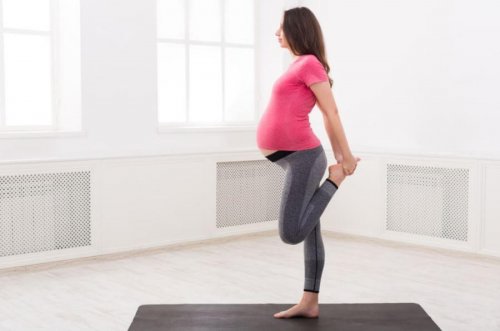Exercise and Nutrition during Pregnancy

During pregnancy, good nutrition is essential for the proper development of the fetus and good health of the mother. But, you can’t just focus on nutrition! Pregnant women gain weight more easily and therefore must pay attention to what they eat. So, experts recommend that the expectant mother finds a fitness routine that adapts to her lifestyle and includes proper nutrition during pregnancy.
Nutrition during pregnancy
Let’s start by mentioning some guidelines about nutrition during pregnancy and advice about what pregnant women should and shouldn’t consume.
- A way of making sure that both you and your baby are getting enough nutrients and energy is to eat three main meals a day. Add fruits to your diet too, after meals and as a snack.
- Stay hydrated. Drink eight cups of water each day.
- Try to avoid eating raw eggs, fish, or meat and make sure that you thoroughly wash any raw fruits and vegetables.

- Follow a balanced and varied meal plan. Include all food groups on your menu: cereals, roots, leafy greens, fruits, milk, meat, and eggs, as well as fats, oils, and sugars (either refined sugar or honey) in moderation.
- During pregnancy, you’ll need to take certain vitamin supplements and minerals, such as folic acid, iron or calcium.
- Don’t drink alcohol, smoke or take drugs. Alcohol consumption can cause slow growth, eye and joint anomalies, intellectual disability, malformations or even miscarriage.
- Decrease or eliminate coffee consumption during pregnancy. Studies show that caffeine enters the placenta and affects the baby’s heart rate and breathing.
- Moderate your sodium intake. Remember that ultra-processed foods contain high amounts of salt. Therefore, avoid canned foods, processed meats, and sauces, among others.
Exercise during pregnancy
Now let’s talk about which exercises you can perform during pregnancy without putting your baby at risk; exercises that are beneficial for you as well.
Keep in mind that each woman has a certain degree of endurance and your physical shape before you became pregnant is also important.
High-impact
- Walking: without a doubt, this is one of the most beneficial exercises pregnant women can do and it has no risk unless your doctor says otherwise. The time and pace will depend on your physical condition and whether you’re used to exercising or not.
- Running: although it may seem like the opposite, running is one of the best exercises pregnant women can do. In order to do it, don’t forget to first ask your doctor about your health status. Plus, whether you should run or not, will also depend on which trimester you’re in. As we mentioned, running is extremely beneficial during pregnancy but you must, of course, be cautious.
- Gymnastics: this activity is perfect for pregnant women, even if you have never practiced it before. The exercises you can do should be basic gymnastics, which don’t require too much effort.

Low-impact
- Swimming: it’s the ideal sport to do during pregnancy and you can practice this, even in the later months, without any restrictions. Plus, it’s an exercise that improves blood circulation. Exercises in water for pregnant women are perfect to train the whole body. They can make you feel more comfortable since you won’t feel the whole weight of your body.
- Yoga: it’s perfect, just like gymnastics, because it can be easily adapted to each woman. In this activity, you’ll be doing gentle and breath coordinated movements, which will ease you into being more flexible.
- Pilates: highly recommended for pregnant women, especially with the use of a Pilates ball. It will help you stay in shape, train your muscles, relax and prepare your body for childbirth.
As you can see, exercise and nutrition during pregnancy are extremely important, so don’t forget these guidelines and plan your diet and workouts to stay strong and healthy.
During pregnancy, good nutrition is essential for the proper development of the fetus and good health of the mother. But, you can’t just focus on nutrition! Pregnant women gain weight more easily and therefore must pay attention to what they eat. So, experts recommend that the expectant mother finds a fitness routine that adapts to her lifestyle and includes proper nutrition during pregnancy.
Nutrition during pregnancy
Let’s start by mentioning some guidelines about nutrition during pregnancy and advice about what pregnant women should and shouldn’t consume.
- A way of making sure that both you and your baby are getting enough nutrients and energy is to eat three main meals a day. Add fruits to your diet too, after meals and as a snack.
- Stay hydrated. Drink eight cups of water each day.
- Try to avoid eating raw eggs, fish, or meat and make sure that you thoroughly wash any raw fruits and vegetables.

- Follow a balanced and varied meal plan. Include all food groups on your menu: cereals, roots, leafy greens, fruits, milk, meat, and eggs, as well as fats, oils, and sugars (either refined sugar or honey) in moderation.
- During pregnancy, you’ll need to take certain vitamin supplements and minerals, such as folic acid, iron or calcium.
- Don’t drink alcohol, smoke or take drugs. Alcohol consumption can cause slow growth, eye and joint anomalies, intellectual disability, malformations or even miscarriage.
- Decrease or eliminate coffee consumption during pregnancy. Studies show that caffeine enters the placenta and affects the baby’s heart rate and breathing.
- Moderate your sodium intake. Remember that ultra-processed foods contain high amounts of salt. Therefore, avoid canned foods, processed meats, and sauces, among others.
Exercise during pregnancy
Now let’s talk about which exercises you can perform during pregnancy without putting your baby at risk; exercises that are beneficial for you as well.
Keep in mind that each woman has a certain degree of endurance and your physical shape before you became pregnant is also important.
High-impact
- Walking: without a doubt, this is one of the most beneficial exercises pregnant women can do and it has no risk unless your doctor says otherwise. The time and pace will depend on your physical condition and whether you’re used to exercising or not.
- Running: although it may seem like the opposite, running is one of the best exercises pregnant women can do. In order to do it, don’t forget to first ask your doctor about your health status. Plus, whether you should run or not, will also depend on which trimester you’re in. As we mentioned, running is extremely beneficial during pregnancy but you must, of course, be cautious.
- Gymnastics: this activity is perfect for pregnant women, even if you have never practiced it before. The exercises you can do should be basic gymnastics, which don’t require too much effort.

Low-impact
- Swimming: it’s the ideal sport to do during pregnancy and you can practice this, even in the later months, without any restrictions. Plus, it’s an exercise that improves blood circulation. Exercises in water for pregnant women are perfect to train the whole body. They can make you feel more comfortable since you won’t feel the whole weight of your body.
- Yoga: it’s perfect, just like gymnastics, because it can be easily adapted to each woman. In this activity, you’ll be doing gentle and breath coordinated movements, which will ease you into being more flexible.
- Pilates: highly recommended for pregnant women, especially with the use of a Pilates ball. It will help you stay in shape, train your muscles, relax and prepare your body for childbirth.
As you can see, exercise and nutrition during pregnancy are extremely important, so don’t forget these guidelines and plan your diet and workouts to stay strong and healthy.
All cited sources were thoroughly reviewed by our team to ensure their quality, reliability, currency, and validity. The bibliography of this article was considered reliable and of academic or scientific accuracy.
- Tinloy, J., Chuang, C. H., Zhu, J., Pauli, J., Kraschnewski, J. L., & Kjerulff, K. H. (2014). Exercise During Pregnancy and Risk of Late Preterm Birth, Cesarean Delivery, and Hospitalizations. Women’s Health Issues. https://doi.org/10.1016/j.whi.2013.11.003
- Gavard, J. A., & Artal, R. (2008). Effect of Exercise on Pregnancy Outcome. Clinical Obstetrics and Gynecology. https://doi.org/10.1097/GRF.0b013e31816feb1d
This text is provided for informational purposes only and does not replace consultation with a professional. If in doubt, consult your specialist.








